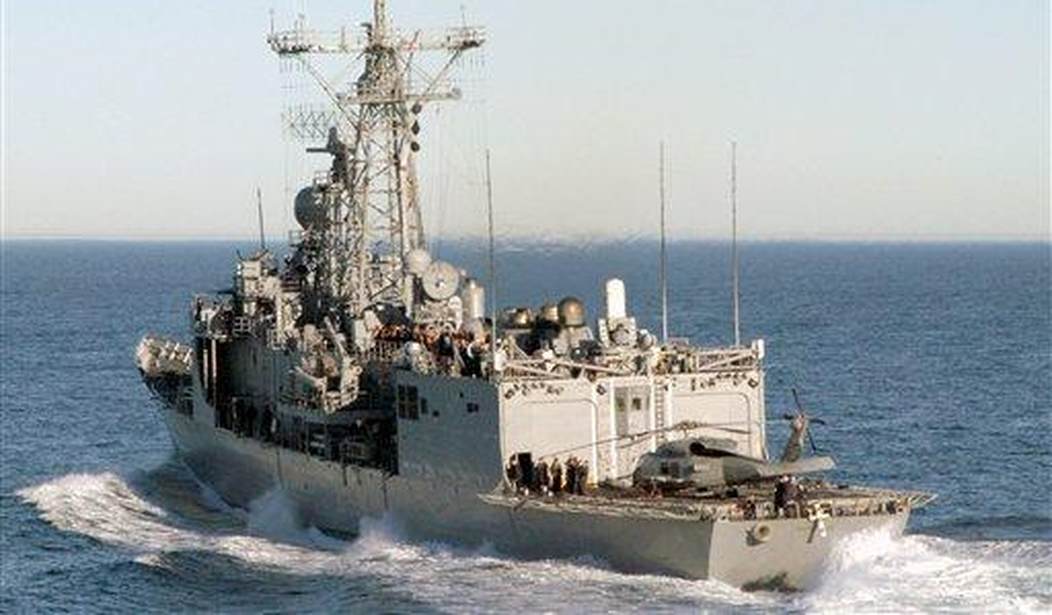In a stunning, but not altogether surprising statement, America’s top Navy official declared that “fighting climate change” is a “top priority” for the U.S. Navy. Navy Secretary Carlos Del Toro announced this last week not at the Pentagon or the U.S. Naval Academy, but at a conference in the Bahamas.
It is likely that Chinese President Xi Jinping and Russian President Vladimir Putin, meeting this week in Moscow to discuss closer military cooperation, shared a high five on hearing the Navy Secretary’s declaration.
Del Toro’s admission that strengthening America’s dwindling fleet of naval ships is no higher a priority than is “embracing climate-focused technologies” was not totally unexpected.
Since taking office two years ago, President Biden repeatedly has stated that “fighting climate change” is and will remain his top national security priority. This was made crystal clear in an October 2021 presidential “Fact Sheet” directed to our nation’s military, foreign policy, and national intelligence leaders.
Rather than resist such a priority directive, the Navy Secretary joined other top Defense officials and saluted their Commander-in-Chief’s warped policy decision; one that will further weaken our country’s defenses. Making matters worse, Biden’s latest defense budget submission to the Congress proposes a 40 percent increase in “climate spending” and a net decrease in the number of operational ships in our Navy’s fleet, continuing a troubling trend highlighted in the Administration’s FY 2023 budget proposal.
Recommended
Such cuts reflect what one military expert refers to as “seablindness” — a short-sighted policy accounting for America’s shrinking dominance of the world’s oceans, a strength on which we and the entire Free World have relied since World War II.
In an insightful analysis just published in The Atlantic (“The Age of American Naval Dominance Is Over”), former Navy officer Jerry Hendrix chronicles the many shortcomings in our country’s civilian and naval shipbuilding capabilities, even as Russia and China aggressively continue to expand theirs.
In one striking example, Hendrix notes that Russia maintains a robust fleet of Arctic ships and has been moving in the direction of unilaterally declaring parts of the Arctic Ocean within its territorial waters, while the U.S. “has not built an Arctic-rated surface warship since the 1950s.”
Also questionable is our capability to quickly or timely build needed ships, considering the small number of U.S. shipyards capable of constructing such massive and complex vessels (as Hendrix notes, there remain only one dozen such “graving docks” certified to build or work on Navy ships).
Elsewhere, China has embarked on a massive, multi-year expansion of its Navy and is asserting claims to large swaths of the East and South China Seas.
Currently, neither of our two adversaries’ navies come near to matching our overall naval capabilities, especially when it comes to our premier warship the aircraft carrier. But our failure to expand, much less retain, a commitment to domestic maritime and naval shipbuilding, has created a long-term weakness in being able to protect oceanic trade routes on which we and almost all other nations increasingly rely.
Budget cuts by the current and prior administrations of both political parties, especially the Clinton administration, purposefully reduced the number of defense contractors able to build modern naval vessels, and policies have favored development and modernization of air power over naval power. The resulting slippage in the number of operational naval vessels in our fleet, now down to 293, imperils our ability to project power in the decades ahead and also to maintain the freedom of the oceans for commercial purposes.
One facet of naval power in which the United States maintains a clear advantage over every other maritime power is in the number of foreign bases and port facilities available to our ships; but even here, China is moving to close that gap. While China has a long way to go in this regard, it is aggressively expanding its reach on the west coast of Africa, and continues to use its “civilian” shipping company, Cosco, to build and operate container port facilities in areas long allied with the United States, including Israel, western Europe, and South and Central America.
If the United States continues the folly of focusing on “climate change” rather than taking concrete short and long-term steps to counter Chinese and Russian moves to assert sea power interests adverse to ours, we and the entire Free World will pay a heavy price in the decades ahead.
Bob Barr represented Georgia’s Seventh District in the U.S. House of Representatives from 1995 to 2003. He served as the United States Attorney in Atlanta from 1986 to 1990 and was an official with the CIA in the 1970s. He now practices law in Atlanta, Georgia and serves as head of Liberty Guard.
























Join the conversation as a VIP Member